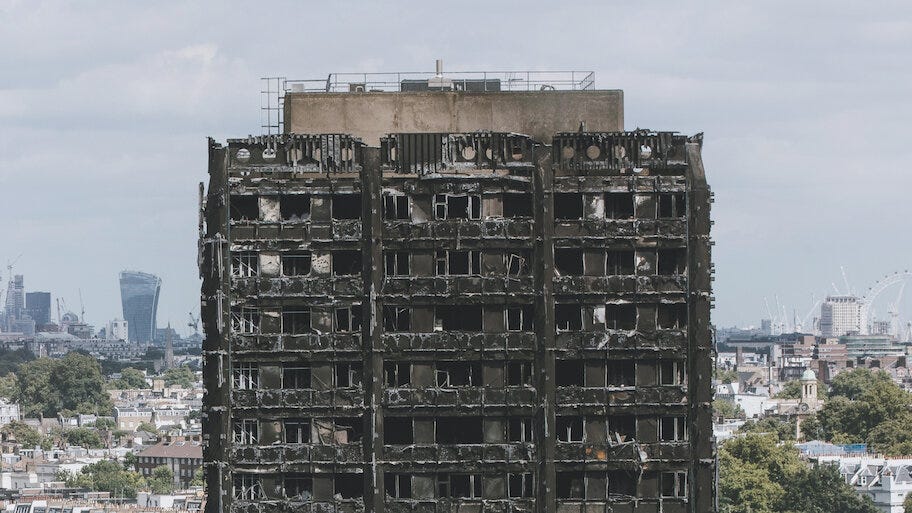#20 The Salt Path, NDAs and Netflix's Grenfell documentary
Plus, a play I've been working on...
This week I’ve been enjoying the many freedoms life has to offer after being beset by the twin-headed summer plagues of flu and interminable heat, including gorging on Netflix documentaries and an impromptu trip to Margate (my travel hack for that is to spend the hottest part of the day on the gloriously empty and air-conditioned train, staying until about 9.45pm to see the streaky sunset then getting the last train home, especially if you’ve got a dog in tow and she has a habit of snuffling all the sand onto anyone within a 20 metre radius. Thanet Council’s map handily shows when and where they’re allowed on Margate’s many beaches.
The Salt Path scandal
Until this week, all I knew of this tale of an older couple’s recovery from financial and physical catastrophe was 1. The schlocky trailer for the film adaptation starring Gillian Anderson and Jason Isaacs reminding me of the beauty of Nomadland and 2. Jason speaking on Table Manners so passionately about the two real-life protagonists’ quest to walk the South West coastal path after being royally stiffed by life.
The story goes, or at least went: Man (Moth) and wife (Raynor) make investment in Moth’s friend’s scheme, friend fucks them over, the couple lose their house, Moth (who is called Moth because it’s the middle of Timothy, like me deciding to be Phi from here on out) discovers he has a horrendous, degenerative autoimmune disease, so he and Raynor…go on a walk round Cornwall to resolve their issues, sleeping rough and relying on the kindness of strangers. The more Moth walked, the better his condition got...? I’m getting to an age where I crave being out in nature, consider a day doing a walk near Tunbridge Wells a highlight of the year and find looking at tree bark kind of relaxing, but the notion that communing with nature, living clean - just like proponents of psyllium husks told us to eat clean - can cure incurable illness is, well, it’s for the birds.
The Salt Path story always sounded too good to be true and that’s part of why it sold so well - millions of copies - as a tale of ultra endurance and redemption against the odds, an inspirational adventurers’ quest. That was until last weekend, when The Observer reporter Chloe Hadjimatheou shared what she found after she delved into the couple’s claims and found that not only did they not get fucked over by any friend, they did the fucking over. Sophie Heawood (Phie from now on) delves into the relationship between memoir and fact over on her Substack: “how did she get away with all of this? And how bad does it make all of us look, to be in an industry that now seems so unverified?” and The Rest Is Entertainment rakes through the financial implications this has for the publishing industry, with Richard making the incredible point that this book has been such a success it’s ended up paying for so many other books to exist.
As a journalist, I know that book reviewers and interviewers aren’t the right people to interrogate the financial veracity of memoir, they’re really more vibes-focused and that tends to be the point of fiction. That said, of late (see: Baby Reindeer) a certain weight seems to be given to marketing certain stories as real, as if they’re nothing without this. When in fact, these claims of veracity end up being little more than a high brow rendition of a mid-noughties Big Brother contestant with tiny eyebrows and bright highlights slurring “I’m just being real, what you see is what you get”.
As a researcher working very often now on due diligence intelligence reports for commercial clients, I once again find it astonishing how few industries bother to do a simple root around someone’s past before they invest into them. It’s not just thousands of pounds at stake, but the integrity of entire cultural bastions!
Grenfell: Uncovered
I never thought I’d see a day when the burning point of building materials, the detail of procurement and the patchiness of building regulation could be spelled out in a compelling way, but Netflix’s Grenfell: Uncovered does just that, showing us exactly, through survivors and some relatives of the 72 souls who perished that night, how the disaster unfolded and who was implicated. The documentary sets out as a timeline of events at the North West London tower block on the tragic night of 14th June 2017, when the tower went ablaze all too quickly but then suddenly very slowly, as the torture of those inside is spelled out in agonising and necessary detail. It then becomes a story of austerity, irresponsibility and the fiddly and convoluted free-market-y ways in which we now build British homes: using materials built in one country, owned by another country, regulated by us (but only sort of), installed by a council (who couldn’t seem more removed from the people they purport to represent) and then left to cause completely avoidable harm.
Arconic, Celotex and Kingspan, the companies that provided/installed the faulty cladding, all deny their portion of blame, and to me, part of why they’ve got away with it for so long is because so many facts are too convoluted to unpick. Whenever there’s a tragedy like this, there’s an establishment presumption presuming that the people who actually cared about those who died, the working classes, those still at risk of a similar tragedy, won’t ever get to grips with who did what (or did nothing at all). That’s why this documentary is such fantastic public service journalism. When it comes to making tricky subjects understandable, I’d file it up there with Chernobyl. Peter Apps, the campaigning journalist from Inside Housing, is crucial in understanding the twisty turns and the director of the doc, Olaide Sadiq, has worked wonders on giving this show the balance of human interest and the boring facts, without it ever being boring.
Now, I know I just said that culture reviewers aren’t expected to assess more than vibes, that’s why it’s all the more impressive that Peter Bradshaw, film reviewer at The Guardian, made a simple ask in his review of Grenfell: Uncovered: “Criminal proceedings and convictions and class-action lawsuits seem as far away as ever. What is there left for us in the meantime? To establish a database of all UK buildings that still have the unsafe cladding, always to make sure we know where the stairwell is whenever we check into a hotel or enter any high-rise – and to support the continuing campaign of the survivors.”
Now, some of those are personal decisions to make, but that database of all UK buildings that still have unsafe cladding. It’s a good idea to let people know what kind of home they’re living in, and what they might be moving into, right? Right?
Watch Grenfell: Uncovered on Netflix now
As for me
I’m delighted to be working on my very first fiction project, as script supervisor for my partner’s Edinburgh theatre show, called WANTED.
It’s a story set in the late noughties post-recession era of trying to get by, when two girls from opposite worlds meet on London’s queer scene to avenge a world that’s left them wanting. Their ethical compasses amount, pretty much, to Lindsay Lohan, Tony Soprano and a shared drive to feel wanted in their friendships and relationships while the rest of the world rejects them. My job on the show has been to support Eleanor - who previously wrote and starred in In PurSUEt - with some structure, sprinkle in some cultural references and jokes and ensure continuity. Is it based on real life? Well, kind of. And to paraphrase from Julia Fox’s masterpiece/memoir Down The Drain, names have been changed to protect the innocent…and the guilty. I’m very pleased with what Eleanor’s created, but I’m phenomenally biased, so it’s best that you be the judge of it:
WANTED is on at the Underbelly from 31st July - 24th August and you can get tickets here. And if you fancy a London preview, it’s on at the Hope theatre in Islington from 20th-21st July
And finally
Sssshh don’t tell anyone but I found Doechii’s Glastonbury set. It’s a bit grainy but it’s a masterpiece. Enjoy yourself!





